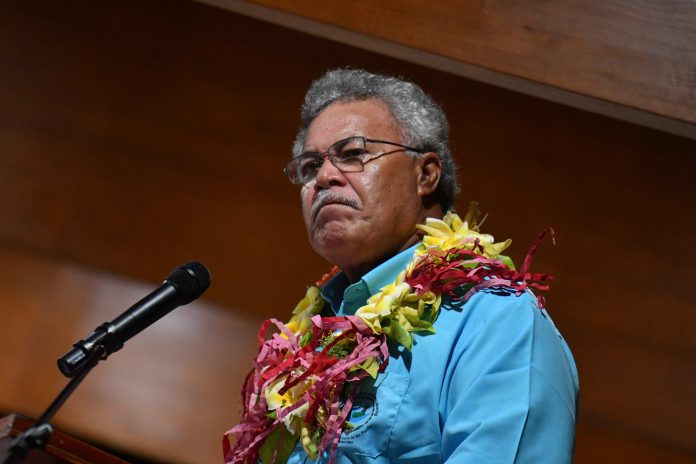Former Pacific leaders have called for “urgent actions” to reduce global carbon emissions, including a commitment to no new coal or gas projects as Anthony Albanese prepares to travel to Fiji for the most important diplomatic regional meeting in the Pacific.
A group of former leaders of Pacific island nations, called Pacific Elders Voice, have called for accelerated efforts to move beyond coal and gas, and for new finance to be made available for loss and damage caused by the climate crisis, in the foreword to a new report released today by the Australia-based Climate Council.
“The latest assessments are clear: global emissions must be halved during this decade. There is no room for new coal and gas,” wrote the group, which includes former leaders of Tuvalu, Kiribati, Marshall Islands and Palau. “The primary security threat to the Pacific islands is climate change.”
The call for action comes as leaders prepare to meet in Suva, Fiji, for the Pacific Islands Forum (PIF), the annual diplomatic meeting of Pacific nations.
Pacific analysts and politicians say that the PIF in Fiji will be the first real test of the new government’s climate commitment.
“I welcome the policies of the new government,” said Enele Sopoaga, the former prime minister of Tuvalu, who is part of the Pacific Elders Voice. “That said … I would urge the new Australian government to step up its response and really make sure the issue of urgency of response and the adequacy of response is there.”
Sopoaga referenced the Albanese government increasing the target for greenhouse gas emissions to be cut by 43 percent, but said such a target was “far from being adequate”.
“They need to do much more, they need to do not just these minimal targets, but move towards meeting more like 75 percent targets to catch up with the rest of the world. These are very tangible gestures that the leaders in Suva will be looking at. Also on funding, they will be looking to Australia to step up funding to the Green Climate Fund for adaptation or mitigation on climate change.”
The report from the Climate Council called on the Australian government to commit to no new coal or gas developments, the new 2030 emissions reduction target of 43 percent, which is soon to be enshrined in legislation, being a “floor not a ceiling”, Australia rejoining the Green Climate Fund and dramatically scaling up its climate finance commitment.
Dr Wesley Morgan, a Climate Council researcher said: “Clearly the new government’s climate policies are a real shift from the previous government.
“That has been welcomed. The Samoan prime minister said ‘this brings Australia into closer alignment with the Pacific’. Of course, Australia’s new climate targets bring Australia into closer alignment with the rest of the world but in no way is Australia leading the pack.”
Morgan said the issue of Australia’s coal and gas exports – Australia is the third largest exporter of fossil fuels in the world – will be a major one for Pacific countries.
“They will want to see substantive signs from the new Australian government that it is going to move away from coal and gas exports. They will want signals that Australia’s love affair with coal and gas is coming to an end.”
“Australia’s failure to act on climate change undermined our national security – nowhere is that more evident than the Pacific,” he said.
“The Pacific Islands Forum is a crucial moment for the Albanese government to reset relations with strategically important Pacific nations, and prove itself as a climate leader.
“Australia will need to show Pacific countries that it is serious about climate action, both by cutting emissions at home and working with the rest of the Pacific to drive global cuts in emissions this decade.”
Next week’s meeting is the first time that the Pacific Islands Forum will be held in-person since Scott Morrison attended in Tuvalu in 2019.
At that meeting, hosted by Tuvalu, a low-lying atoll nation which is considered one of the most vulnerable countries in the world due to rising sea levels, Australia was seen as a pariah in the group due to unwillingness to heed calls for more urgent action to address the climate crisis.
The prime minister of Fiji, Frank Bainimarama, told the Guardian at the 2019 forum that Morrison’s “insulting and condescending” behaviour to the other leaders during their day-long meeting, had almost led to the meeting breaking down and could drive Pacific countries closer to the arms of China.
Since coming to power in May, the Albanese government has attempted to repair relationships with Pacific countries, including by promising more urgent climate action.
The foreign minister, Penny Wong, in a speech in Suva in May, said that under past governments Australia had “neglected its responsibility to act on climate” and showed disrespect to Pacific nations, but was determined to repair the relationship
SOURCE: THE GUARDIAN/PACNEWS













